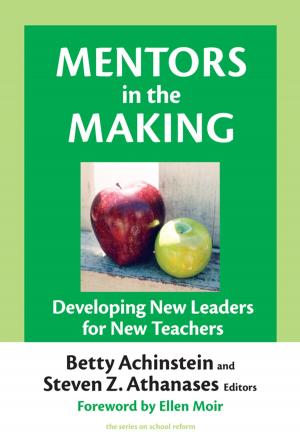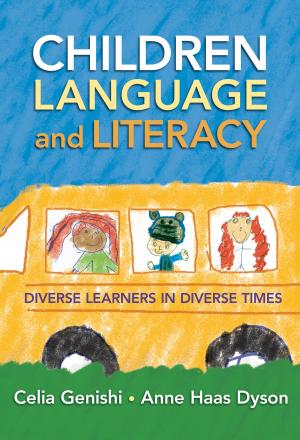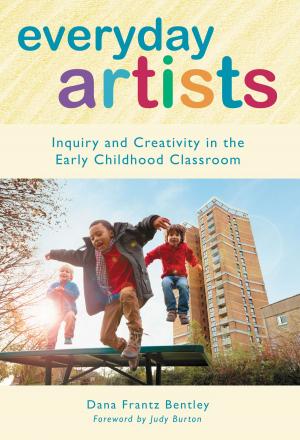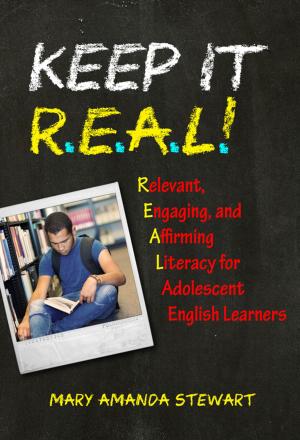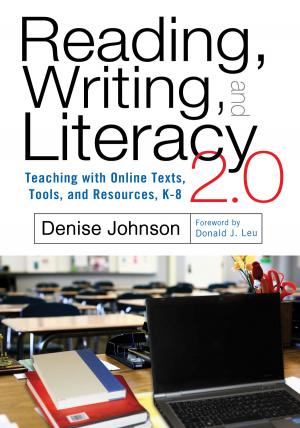Playing Their Way into Literacies
Reading, Writing, and Belonging in the Early Childhood Classroom
Nonfiction, Reference & Language, Language Arts, Literacy, Education & Teaching, Preschool & Kindergarten| Author: | Karen E. Wohlwend | ISBN: | 9780807771853 |
| Publisher: | Teachers College Press | Publication: | December 15, 2009 |
| Imprint: | Language: | English |
| Author: | Karen E. Wohlwend |
| ISBN: | 9780807771853 |
| Publisher: | Teachers College Press |
| Publication: | December 15, 2009 |
| Imprint: | |
| Language: | English |
“This book provides a theoretical and empirical foundation for the development of new and exciting pedagogical approaches to the teaching and learning of digital literacies in the earliest years of schooling... researchers, educators, and policymakers alike ignore its key messages at their peril in the decades ahead.”
—From the Foreword byJackie Marsh, the University of Sheffield, UK
“Play, too often in the past, has been seen as a four-letter word by those who wish to raise academic standards. Wohlwend shows why this position is untenable and why play is a curricular necessity in kindergarten and beyond. This is a must read for anyone worried about what parents and administrators will say about the infusion of play in their curriculum.”
—Jerome C. Harste, Indiana University, Bloomington
Karen Wohlwend provides a new framework for rethinking the boundaries between literacy and play, so that play itself is viewed as a literacy practice along with reading, writing, and design. Through a variety of theoretical lenses, the author presents a portrait of literacy play that connects three play groups: the girls and, importantly, boys, who played with Disney Princess media; “Just Guys” who used design and sports media to make a boys-only space; and a group of children who played teacher with big books and other school texts. These young children "play by design"—using play as a literacy to transform the texts that they read, write, and draw—but also as a tactic to transform their relational identities in the social spaces of peer and school cultures.
Emphasizing the importance of play despite current high-stakes testing demands, this book:
- Provides an argument for re-centering play in early childhood curricula where play functions as a literacy in its own right.
- Offers cutting-edge analyses and examples of new literacies, popular culture, and multimodal discourses.
- Illustrates how children’s play can both produce and challenge normative discourses regarding ethnicity, gender, and sexuality.
- Examines the multimodal, multimedia textual practices of young children as they play across tensions among popular media, peer relationships, and school literacy.
- Features vivid descriptions, examples of young children in action, and photographs.
Karen E. Wohlwendis an assistant professor in Literacy, Culture, and Language Education at Indiana University. The research in this book was awarded the 2008 International Reading Association Outstanding Dissertation Award.
“This book provides a theoretical and empirical foundation for the development of new and exciting pedagogical approaches to the teaching and learning of digital literacies in the earliest years of schooling... researchers, educators, and policymakers alike ignore its key messages at their peril in the decades ahead.”
—From the Foreword byJackie Marsh, the University of Sheffield, UK
“Play, too often in the past, has been seen as a four-letter word by those who wish to raise academic standards. Wohlwend shows why this position is untenable and why play is a curricular necessity in kindergarten and beyond. This is a must read for anyone worried about what parents and administrators will say about the infusion of play in their curriculum.”
—Jerome C. Harste, Indiana University, Bloomington
Karen Wohlwend provides a new framework for rethinking the boundaries between literacy and play, so that play itself is viewed as a literacy practice along with reading, writing, and design. Through a variety of theoretical lenses, the author presents a portrait of literacy play that connects three play groups: the girls and, importantly, boys, who played with Disney Princess media; “Just Guys” who used design and sports media to make a boys-only space; and a group of children who played teacher with big books and other school texts. These young children "play by design"—using play as a literacy to transform the texts that they read, write, and draw—but also as a tactic to transform their relational identities in the social spaces of peer and school cultures.
Emphasizing the importance of play despite current high-stakes testing demands, this book:
- Provides an argument for re-centering play in early childhood curricula where play functions as a literacy in its own right.
- Offers cutting-edge analyses and examples of new literacies, popular culture, and multimodal discourses.
- Illustrates how children’s play can both produce and challenge normative discourses regarding ethnicity, gender, and sexuality.
- Examines the multimodal, multimedia textual practices of young children as they play across tensions among popular media, peer relationships, and school literacy.
- Features vivid descriptions, examples of young children in action, and photographs.
Karen E. Wohlwendis an assistant professor in Literacy, Culture, and Language Education at Indiana University. The research in this book was awarded the 2008 International Reading Association Outstanding Dissertation Award.

